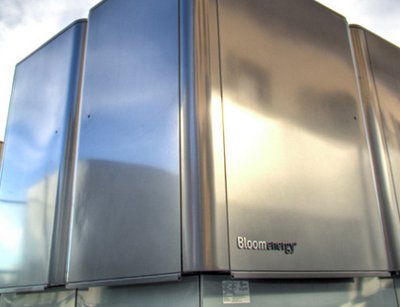Apple’s North Carolina data center will use fuel cells provided by Bloom Energy, which in February said it creating cells specifically for the data center market with a product that will be seen in use within two years.
According to a report today by cnet, Bloom Energy CEO KR Sridhar said the Maiden data center, currently under construction, will use 4.8MW of power from the fuel cells, making it the largest corporate installation for Bloom Energy yet.
It is an interesting win for Bloom Energy. Many experts have said that its fuel cells work best in states such as California where tax breaks for the use of the fuel cells are high.
One discussion on DCD Linkedin focusing on bloom energy generated much praise of the company’s work with energy efficient fuel cells, but some respondents said the success of the fuel cells are reliant on the abundance of natural gas and its cost compared with electricity.
North Carolina offers corporate tax credits for solar, landfill gas, biomass and other renewable energy with a maximum incentive of US$2.5m per installation.
Apple is already building a solar farm next to its Maiden data center, but has not confirmed if this will be used for data center purposes.
Its data center, codenamed Project Dolphin is scheduled to launch in May.
The fuel cells use powdered sand formed into a ceramic square and technology developed by the semiconductor industry to product an electrochemical reaction for a clean power source. It relies on energy created by a natural gas plant onsite or delivered through the grid to kick-start the process.
Sridhar made the announcement at the official opening of Bloom Energy’s Manufacturing Center, built on a 272-acre site in Newark Delaware previously occupied by Chrysler and now owned by the University of Delaware.
It is part of the university’s new Science, Technology and Advanced Research Campus, and Bloom, an anchor tenant at the campus, said it will work with the university on product innovation.
Other new Bloom customers were announced at the site’s opening, including Owens Corning, Urban Outfitters, Delmarva Power, Washington Gas and AT&T, which has Bloom Boxes already installed at its California sites.
Apple has been careful to reinstate its green data center credentials in recent weeks after coming under attack from Greenpeace on its perceived energy consumption in its report How Clean in My Cloud?. It said Apple received 55% of its energy for data center facilities in Maiden and Prineville from coal-powered plants, a claim which instigated a number of protests at Apple stores around the world in recent weeks.
Apple hit back saying it generated 60% of its power on site using renewable sources including a solar farm and fuel cell installation “which will each be the largest of their kind in the country”.

